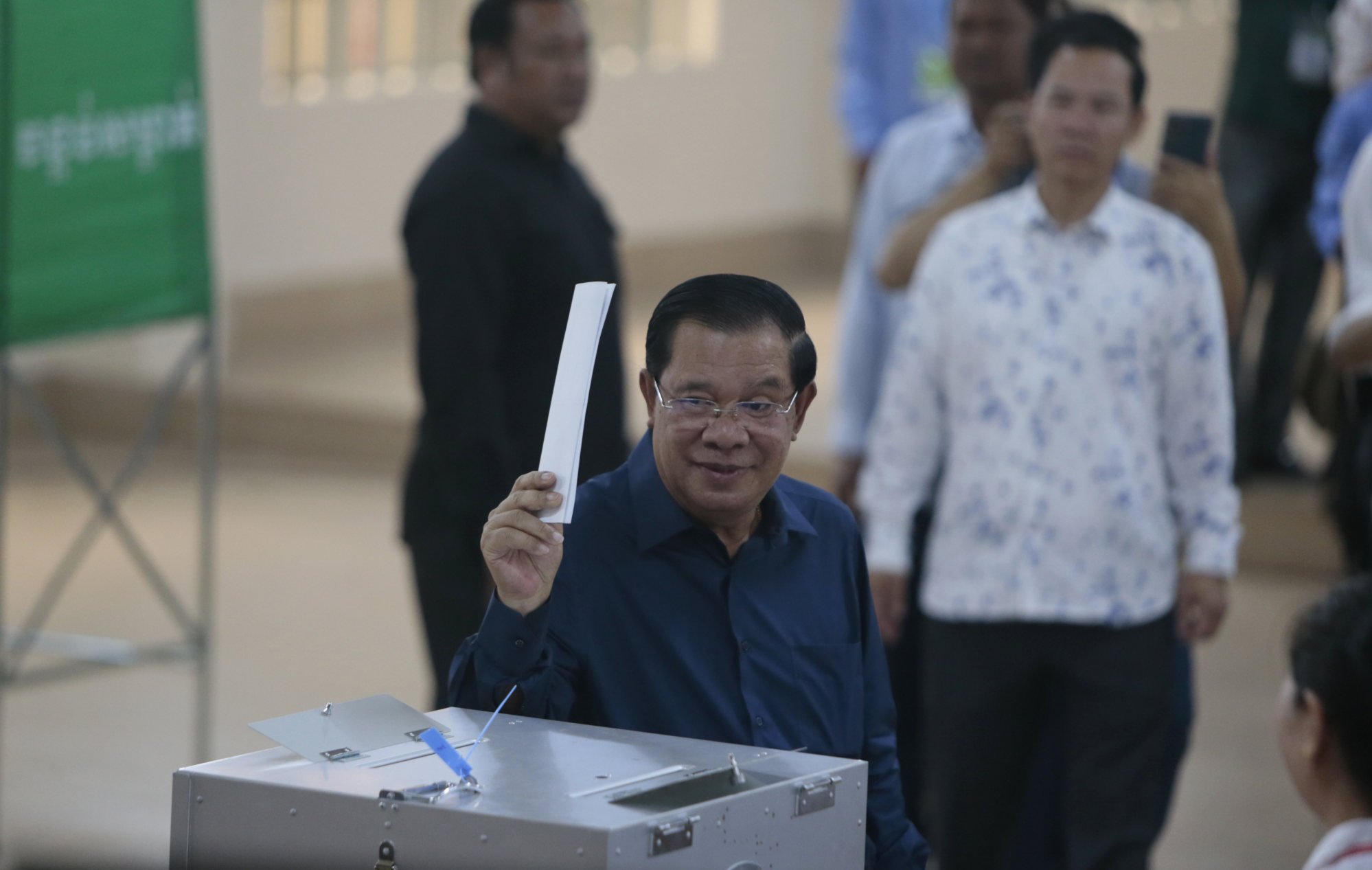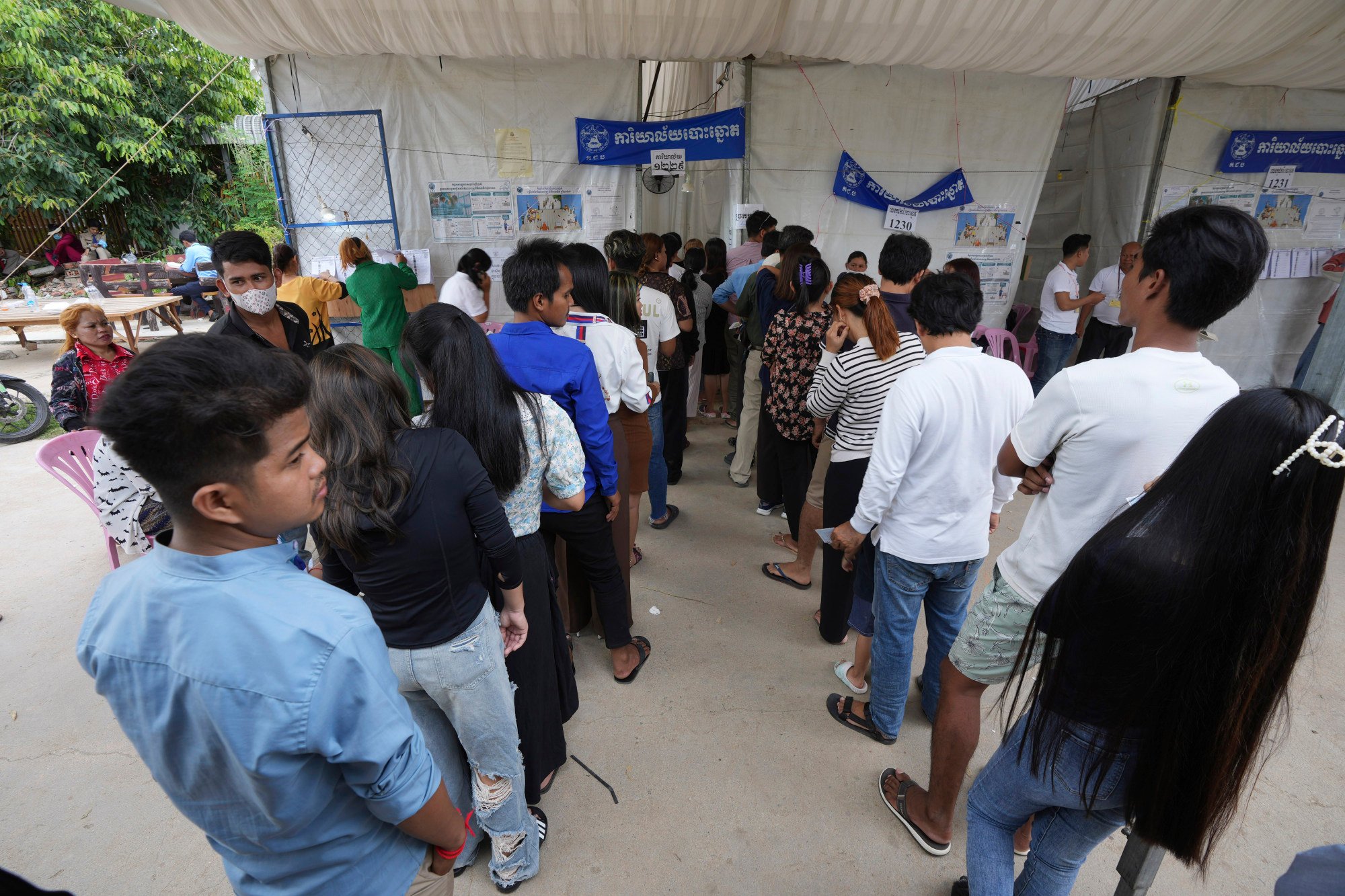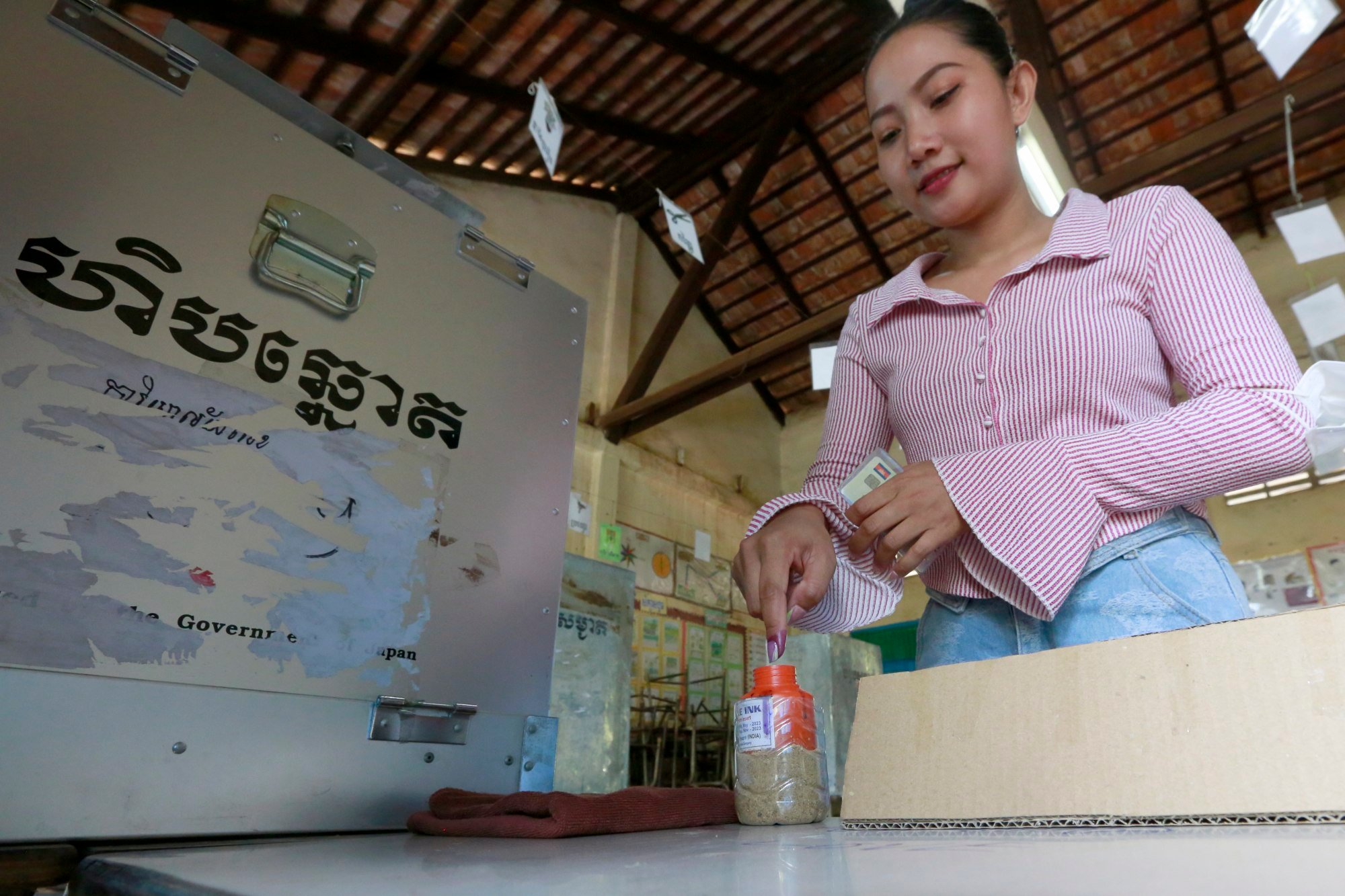
Cambodia election: Hun Sen’s ruling party claims victory, says son Hun Manet wins seat
- The prime minister’s Cambodian People’s Party is likely to retain all 125 seats in the National Assembly, in an election dismissed by many as a sham
- Party also says Hun Sen’s son and anointed successor Hun Manet has won a seat, making him eligible to become premier if chosen by the house
“We’ve won in a landslide … but we can’t calculate the number of seats yet,” said Sok Eysan, spokesperson for the Cambodian People’s Party (CPP), which ran virtually unopposed.
The party also said it was “very clear” the son and anointed successor of the prime minister has won a seat in the National Assembly, a step that would make him eligible to become premier if chosen by the house.
On Thursday Hun Sen indicated that Western-educated military general Hun Manet, a list MP for the CPP, could take over next month if he was eligible. CPP spokesperson Sok Eysan said of Hun Manet: “It’s very clear he has got elected.”
Hun Sen said a turnout of 84 per cent was evidence that a campaign by his “extremist” opposition to undermine the vote had failed.
Cambodians were voting in an election that saw all meaningful opposition banned and was certain to prolong the CPP’s dominance of politics, clearing the path for a historic leadership transition and the end of the reign of one of the world’s longest-serving prime ministers.
The contest was effectively a one-horse race, with the CPP, a political behemoth with a vast war chest, facing no viable opponent after a ruthless, years-long crackdown on its rivals.
Activists dismissed the election as a sham, with the CPP up against 17 mostly obscure parties, none of which won seats in the last election, in 2018.
The CPP was likely to retain all 125 seats in the lower house, prolonging Hun Sen’s grip on power and paving the way for a dynastic succession some critics have compared to North Korean politics.
Long queues formed at polling stations through the morning. By noon local time, 6.2 million of the 9.7 million eligible voters had cast ballots, according to National Election Committee official Dim Sovannarom.
Hun Sen has led Cambodia for 38 years and has brushed off Western concern about the election’s credibility, determined to prevent any obstacle in his carefully calibrated transition to his anointed successor and eldest son, Hun Manet.
No time frame had been given for the handover until Thursday, when Hun Sen signalled his son “could be” prime minister next month, depending on “whether Hun Manet will be able to do it or not”. He needs to win a National Assembly seat to become prime minister.

Hun Manet, 45, dressed in a green safari shirt, smiled and posed for photographs with supporters after voting in the capital Phnom Penh before a throng of media.
“We have exercised our civil right and responsibility and right … of citizens to vote to choose the party we love to lead the country,” he said after casting his ballot.
He ducked questions on the prospect of becoming prime minister and whether he would rule differently from his father. “No comment please, no comment please. I’ve just come to vote,” he said in English, smiling.
Analysts had expected the transition to come midterm, giving time for Hun Manet to earn legitimacy with the public and political elite.
“Transferring power while he is still physically and mentally well allows Hun Sen to strongly protect his son from any internal challenges,” said Gordon Conochie, adjunct research fellow at La Trobe University and author of a new book on Cambodia’s democracy.

“As long as Hun Sen is around, nobody will move against Hun Manet.”
Hun Manet has given few media interviews and no clues over his vision for Cambodia and its 16 million people.
He earned a master’s degree at New York University in the US and a doctorate at Britain’s University of Bristol, both in economics. He attended the West Point military academy in the US, helping him rise through the ranks of Cambodia’s military to army chief and deputy armed forces commander.
Major powers will be watching closely for signs of whether Hun Manet will maintain the authoritarian status quo of his father or pursue greater liberalisation and a more Western style of democracy.
A key focus will be if he seeks to steer Cambodia out of the orbit of China and patch up ties with the United States that have perennially been strained by his father’s iron-fisted approach.
Hun Manet is part of what is expected to be a broader generational change, with the CPP planning to install younger leaders into most ministerial positions.
“That’s going to be the big change of guard, that’s what I’m watching,” said Astrid Norén-Nilsson, a Cambodia expert at Sweden’s Lund University. “It’s all about the transition, it’s all about who’s going to come in and in what positions they find themselves.”
Hun Manet received a rock-star reception at a big rally on Friday, where he promised a vote for the CPP was for a bright future” and warned of unspecified “extremist” attempts to “destroy the election”.
The rhetoric echoes that of Hun Sen in his vitriol against opponents and pre-emptive strikes since May that have included disqualifying the CPP’s only meaningful rival, the Candlelight Party, over a paperwork technicality.
Authorities also banned self-exiled opposition figurehead Sam Rainsy and 16 allies from voting and contesting elections for two decades for urging Cambodians to destroy their ballots.

Some did that on Sunday, posting pictures on social media of spoiled ballots, some with writing that disparaged Hun Sen, calling him a coward. Pro-government Freshnews said authorities were investigating, while other media reported one person was arrested for taking a ballot home.
Voter Nan Sy, a former lawmaker himself with a smaller royalist party, said the main issue for him was stability.
“Without stability we cannot talk about education, we cannot talk about development,” the 59-year-old said without saying who he voted for.
There were few reports of any protests against the elections, but General Khieu Sopheak, Cambodia’s national police spokesperson, said 27 people were being sought over allegations they called for voters to spoil their ballots in a Telegram chat channel. He said there had been two arrests at polling stations as well.

Hun Sen cast his vote just outside the capital, kissing his ballot paper before posting it and smiling for cameras with an ink-stained finger.
His CPP’s selling point has been its rural development and ensuring peace and stability after decades of war, which helped spur average growth of more than 7 per cent until 2019, creating jobs in garment manufacturing and construction.
“I don’t really need more from the new leader,” voter Nin Sinath, 58, said on Hun Sen’s succession. “I have what I want now, we have peace and prosperity for the people already.”
Additional reporting by Associated Press, Agence France-Presse


